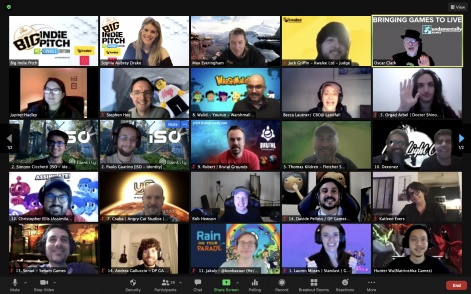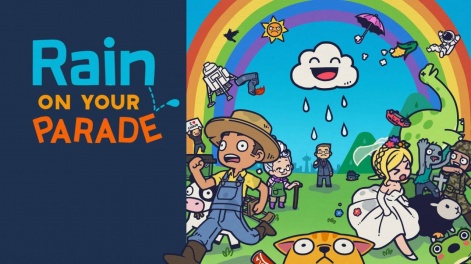The Big Indie Pitch is a regular event run by the makers of Pocket Gamer and PC Games Insider. It sees indie developers engage in a speed-dating-styled pitching competition for fame and those sweet, sweet promotional packages.
The event gives indies five minutes to pitch their games to a panel of press, publishers and industry pundits. The judges then pick three winners and everybody gets valuable feedback.
The indie view
The Big Indie Pitch is getting bigger and bigger as we bring it to events all across the world. To give you an idea of what the event is like, who attends the events and the games on show, we've sat down with a number of past PC Indie Pitch contestants to offer their views.
Today, we're speaking to Unbound Creations' Jakub “Koobazaur” Kasztalski, who submitted Rain on Your Parade to The Big Indie Pitch (PC+Console Edition) at Pocket Gamer Connects Digital #5 and walked away as the winner.

Sophia Aubrey Drake: Tell us a little about yourself and your indie studio - who is on the team, and what are their inspirations?
Jakub Kasztalski: Unbound Creations is an award-winning, independent game studio founded and led by me, Jakub “Koobazaur” Kasztalski. Hi! I am Polish, travelling guy, currently in Seattle. I lived all over the world working on games, storytelling and even cinematography at one point. I studied humanities and ethnic conflict, all of which inspire my creative works.
We released 4 titles so far, focusing on creating believable worlds and giving players meaningful narrative choices. We are best known for our two “Headliner” games about fake news and its effects on the society around us. Our titles won multiple awards, been exhibited at various shows (such as PAX, Tokyo Game Show, or GamesCom) and even featured in museums and classrooms.
With “Rain on Your Parade,” there are four other people on the team. Emmy is our fantastic 2D artist behind Cloudy and all the characters/UI; she has been helping me since the first “Headliner.” Joe is our 3D artist, giving a unique look and feel to our diorama levels. Dane is the second developer/designer beside me, and responsible for some of our best levels. And lastly, Eli is our marketing guy, always looking for new opportunities and sharing only the best memes on social media!
I think everyone was drawn to the project due to its silly and fun nature, giving us a lot of flexibility to explore different ideas and play around with the design. I'll delve a bit more into my own personal inspirations in the questions below.
Tell us about Rain on Your Parade that you pitched at the competition.
“Rain on Your Parade” is a slapstick comedy game where you play as a cute cardboard cloud determined to ruin everybody’s day. Travel the world and unlock new methods of mischief in over 50 levels, each with a unique setting and objectives. Customize your cloud with hats and accessories and even draw your own face! This is the most adorable schadenfreude simulator.
It is releasing on April 15th, 2021 on PC, Nintendo Switch and Xbox One!
What do you think are the most unique and interesting aspects of Rain on Your Parade that gamers may never have seen before.
The most unique element is the sheer variety of ideas and game modes, constantly mixing up the formula and paying homage to some of our favorite TV shows, games and mechanics. While there have been other great games that did something similar and inspired us (such as “What the Golf” or “WarioWare”), we wanted to go a step further and really commit to some of our outlandish ideas. I don’t want to spoil too much, but let’s just say it’s more than just a set of random mini-games. We worked hard to tie it all together with our cute protagonist, rewarding central gameplay, and just the right dose of meta-narrative for players to discover.
There is a method to the madness, and in the end, it’s a layered experience where I hope anyone will be able to find at least one thing they will absolutely love. It’s also the kind of game where both kids and parents can play and enjoy for different reasons.
Rain on Your Parade is an adventure puzzler filled with light-heartened comedy, and as such is very different in theme to your last game Headliner. What made you choose this genre, and what do you think you bring to it that may not have been seen before?
After working on serious political games and following the news closely over the past few years, I definitely felt I needed a break. (It’s even more daunting when you watch some of the more outlandish scenarios in “Headliner,” which were criticized for being too unrealistic, actually play out in real life). So I set out to make something that’s the complete opposite, something colorful, gameplay-focused, and just plain dumb! And what better game, than one where you’re a cute little cloud jerk who ruins everybody’s day ;)?
In a way, “Rain on Your Parade” is my anti-Headliner. Instead of serious, it’s silly. Instead of dark, it’s colorful. Instead of story and choices, it’s gameplay and game feel. From a design perspective, it was a much-needed breath of fresh air.
How did you come to choose the platforms that you would develop Rain on Your Parade for?
I’m a big PC gamer myself and we have a long history of publishing on Steam, so that was a no-brainer.
Nintendo Switch was also a platform I had in mind from the start. Since I ported “Headliner: NoviNews “before, I already had experience with the code required and the publishing process. Additionally, given the upbeat and colorful nature of the game, I think it has a lot of potential to do well there. The crafty diorama look is definitely reminiscent of some Nintendo classics like “Yoshi’s Wooly World” or “Paper Mario.” Around the time when we were revamping the art style, the new “Link’s Awakening” came out (still my favorite Zelda game to this day) and also became a big visual inspiration.
Lastly, with Xbox One, we didn’t have direct experience porting but we did already have the hardware and tools needed to get it done. I’ve worked on Xbox 360 way back on my first game job (at another studio), and knew the Microsoft tools were good to work with. So it made sense to include it as well.
Looking at the studio a little more now. How hard is it to survive as an Indie developer?
There’s definitely been ups and downs. I think the key to survival is understanding the market and your position in it.
Aside from running the game studio, I’ve also been freelancing for over a decade. This gave me financial stability and allowed me to re-invest what my games make back into the studio. My 2nd title (Karaski) was actually a big flop, but I learned a lot from it about the importance of a marketable product, tracking and understanding indicators of potential success (or lack thereof), and not investing all your money into a single project. Not to mention the mental and emotional toll of having wasted two years of your life on a failure.
But from that, I emerged into a more successful model of working on something small and building on top of it. The first “Headliner” was a simple 2D game you could beat in 45 minutes (but stretched it out with branching narrative and multiple playthroughs). It did well enough, so I re-invested the income into “Headliner: NoviNews,” which was much more polished and longer. Then that did well enough, so now I’m re-investing again in “Rain on Your Parade,” which is even bigger and more ambitious.
Going back to the first sentence - the big flop and years after taught me a lot about how the market works (particularly on Steam) and how we are positioned in it (that is, we’re not a studio that can just dump $200k into an influencer marketing campaign). This dictated what I design, how I market it, and how much I am willing to invest in a project. Part of the reason for creating “Rain on Your Parade” was also wanting to make something with a much broader appeal (versus “Headliner,” which was rather niche). It opens up a lot of new doors. The game’s format also lends itself well to expansions and DLC, so if the game is a success, we have a path forward to keep stroking the flames and sustaining ourselves.

Are there any tips and advice you would give to independent developers out there who are just starting out?
You can’t learn from your mistakes until you make them, and some of the most important lessons will only be uncovered after release. Pick a reasonable release date, and stick to it.
I see a lot of developers pouring years into their projects hoping to be the next “Stardew Valley” or “Minecraft.” But odds (really big odds) are this will not happen. This certainly didn’t happen for me. Back on my first game, I realized I was one of those people who are always working but never finishing anything, so I scaled my project way, way down into a short adventure game that could be beaten in half an hour. I gave myself a reasonable deadline and stuck to it. While it wasn’t a huge commercial success, it taught me a lot about the whole publishing process, how to interact with media/reviewers, and how easy it is to get stuck in tunnel-vision during development.
I’m working on my 5th indie game and only now feeling like, maybe I kind of know what I’m doing, a little bit? So don’t waste years on a perfect gem. Make an OK gem as soon as you can, and use that to make the next one better, and then the next one even better, and then the next one. Don’t worry, this is just your first game, and one of many. You’ll have plenty of chances to do better.
That and, if you want to live solely off of your games, don't forget the business aspect.
How did you find your experience pitching as a part of the Big Indie Pitch?
In a way, it was easier, since I could have my notes on the side and no one would know. That being said, a virtual meeting definitely lacks the same kind of energy. I’m more on the extroverted side and actually enjoy giving presentations, so I miss interacting with people directly or being on a stage.
What do you feel you have gained from the experience, and what do you still hope to gain?
We’re definitely getting a few marketing opportunities that are exactly what we need at this stage of our timeline. Announcing the pitch award also got us a mention in 4Gamer, one of the bigger Japanese gaming sites. Every little bit helps to get us on the radar.
I've also made a few connections with publishers/investors which are always good to have for a small studio. And lastly, hearing the positive feedback is definitely very encouraging, and helps us feel secure that we are doing everything right.
What are your hopes for this game in the future, and do you have any plans for any future projects?
Ten million dollars and a mansion in Malibu. Haha just kidding… I prefer colder climates ;)
Jokes aside, I simply want this to be a fun game that a lot of people will like. Financial success would definitely let me catch a breather, and allow me to work on projects I feel passionate about, without worrying about their commercial potential as much. It would also allow me to further expand our team and provide everyone with the resources they need to do their best. It would remove a lot of the constraints that we have now.
As for future projects - we already have a few ideas for potential updates or DLC if things go well. As I mentioned before, the format of the game lends itself really well to expansions, and the simple design makes it very flexible and adaptable. The base game already does a great job of spoofing movies and shows, so it might be fun to work on some bigger and beloved franchises (just imagine little Cloudy ruining the most iconic scenes in your favorite epic space opera with glowy swords!)
That being said, I’m also definitely starting to miss working on serious and political games. I always have some new ideas brewing… Who knows, if the game does well enough, maybe we could work on expansions AND a new serious game at the same time?
Want to show off your exciting new game? We host Big Indie Pitch events throughout the year, so be sure to keep an eye out on our events page for an event near you, or even our new Digital pitches.
All our upcoming pitches including how to enter can be found over on our upcoming events page on BigIndiePitch.com.
Get the latest news, interviews and in-depth analysis on Twitter, Facebook, and our daily newsletter.












